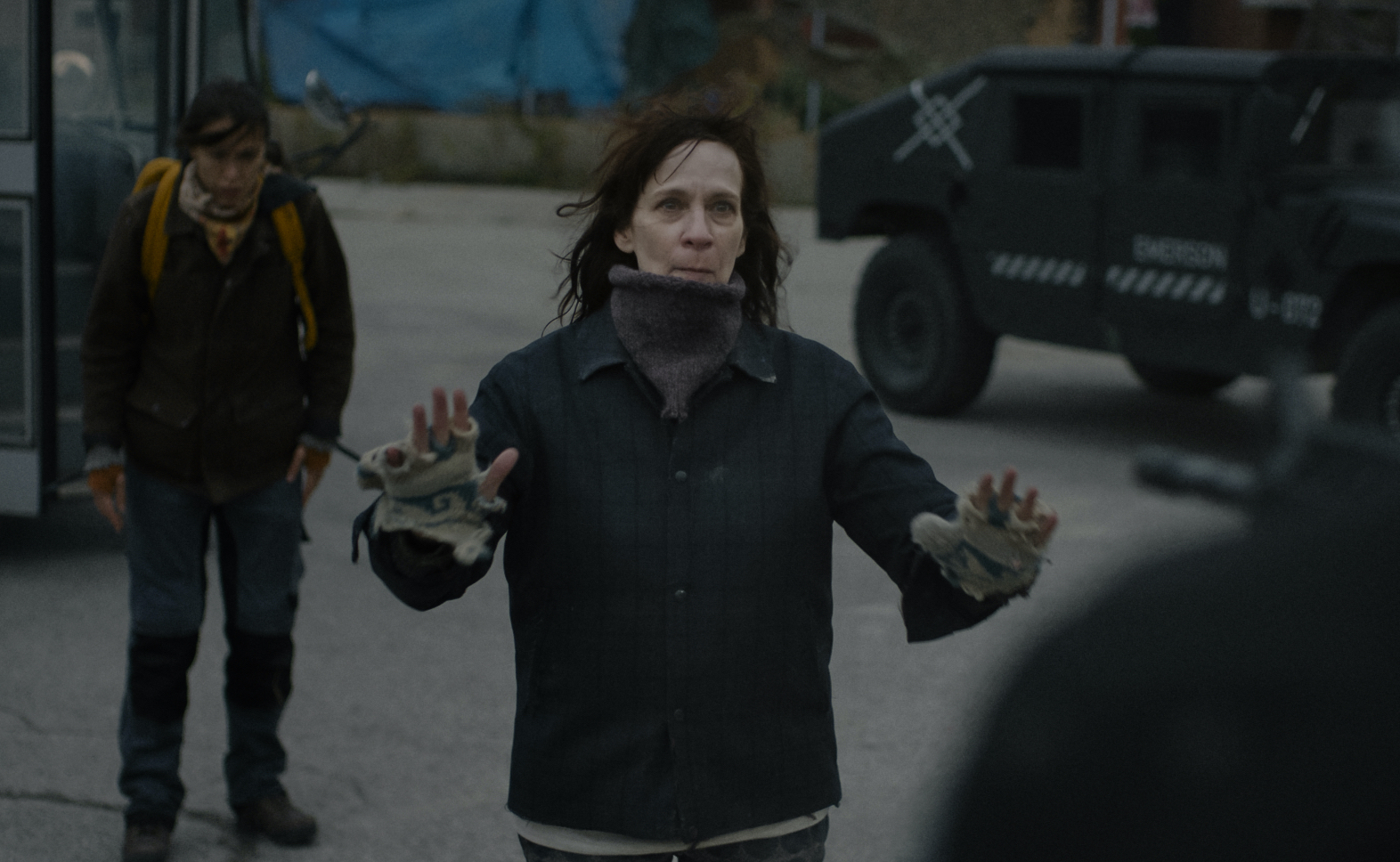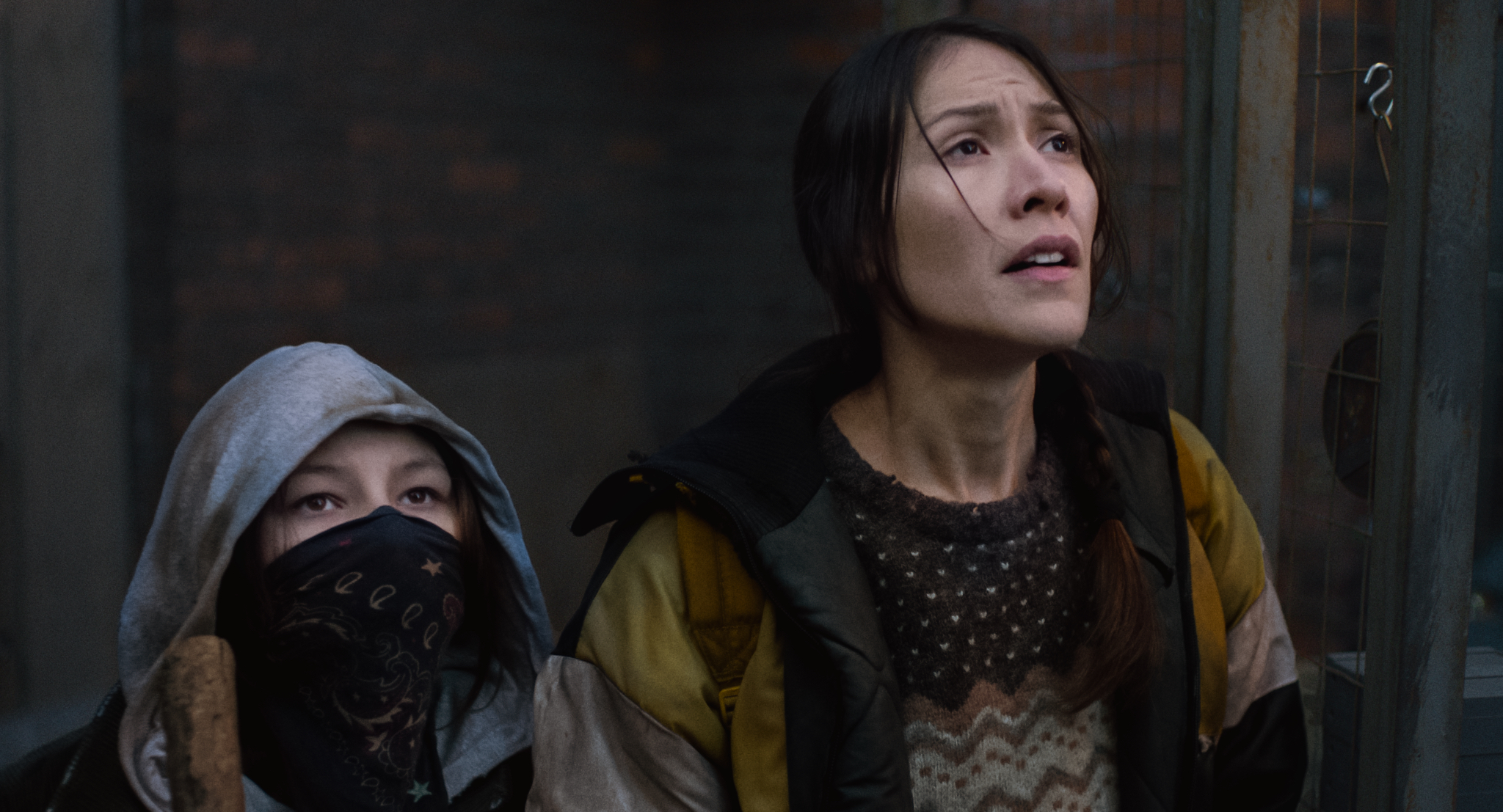Look up synopses of Danis Goulet’s Night Raiders, and you’ll find it slots into a couple of genres: it’s a thriller; it’s science fiction set in the year 2043. But watch the film, and something else is clearly at work. There is no hard-edged narration, no history-textbook exposition, and neither villains nor heroes are fighting using conventional methods. The starting point is the story of a mother (Niska, played by the multitalented Elle-Máijá Tailfeathers, co-director of 2019’s The Body Remembers When the World Broke Open) and daughter (Waseese, newcomer Brooklyn Letexier-Hart) and how they come to be separated. The aesthetic approach, meanwhile, comes from the time-elastic genre category of Indigenous futurism: the reason no one explains what could have gone so wrong in two decades is because Goulet is transmuting what’s been happening in Canada for over two centuries.
“Scholars of Indigenous futurism talk about the fact that the apocalypse has already happened,” Goulet says. “There was a violent takeover of an entire continent, and that is, in many people’s imagination, the worst thing that could happen. And that happened to Indigenous people.”
The crucial analogy in the world of Night Raiders—which had a special presentation at VIFF and goes to general release October 8—is the residential school system and its extended life in the modern foster care system. Before long, Niska’s ability to care for her daughter is undone by the imperiled world she’s living in, and so Waseese finds herself in an educational environment fenced off from the natural world and organized around militarized indoctrination. (There, she’s only referred to as, Elizabeth.)
We might expect Niska to leap into action, to immediately plot a breakout for her vulnerable daughter and others like her. But Goulet’s interest, ever since her first short films, is with social realist characterization: we might learn what Niska is capable of, but not in a way that cancels out the real demoralization that follows a loss of this magnitude.
“What Elle-Máijá and I talked a lot about was shame,” Goulet says. “That is something the residential school system was so effective at doing: not just fracturing families but creating an intergenerational legacy of shame. I remember listening to TRC testimony, and there was a father who stood up and apologized in tears to the whole room—he was really speaking to his children—for not being the dad that he wanted to be. And it just tore my heart apart to know that this was imposed on him, and yet he still felt like it was his fault.”
In a period drama, this kind of struggle would require fidelity to the abuses of church and government; in a modern one, the ongoing pain and slow rebuilding of identity. But Goulet’s choice of Indigenous futurism means she is free to allegorize and rework these expected narratives. On the eve of Night Raiders’ general release, it’s worth noting that for many, Hollywood has set the standard for the post-apocalyptic. Goulet says that, rather than any YA blockbuster, Alfonso Cuarón’s Children of Men is a touchstone: “I don’t think I’ve come across a film since that worked in the dystopian space in quite the same way.”

But her film also shakes off many of those comparisons. For one, it isn’t teasing the promises and despairs of an extended series. And as one narrative turn suggests, even Niska isn’t “the one,” because no one person will be. Instead, it suggests a two-directional approach for the future: the film built international connections (Night Raiders is a co-production that involved Māori actors and crew), and it’s also concerned with the extension of roots, generations forward, at the local level.
“I wanted to make something for my community first,” says Goulet, who is Cree and grew up in northern Saskatchewan. “I definitely made choices to invite them into it…. That is really where I was coming from, in terms of what I was trying to do and thinking about the audiences that I wanted to play for.”
This hasn’t done anything to narrow her work’s appeal. Night Raiders’ world premiere was at the Berlinale, and her films have screened internationally since her festival debut more than a decade ago. But when she had the choice, the first people to see the film, her feature debut, were at the Saskatoon-based nêhiyawak Language Experience, a Cree-language revitalization program.
Waseese’s secret address to the skies, an untranslated refrain in the film (āstam ōta), was a hit, the moments of comedy in the film paid off, and Goulet was reminded, essentially, of why she started trying to get her script completed and produced eight years ago.
“There’s a lot of pressure on youth, and they are always told in our community that they are the future, and they have so much to offer,” Goulet says. “And at the same time, I believe it’s incumbent upon us to give them something to hope for. I think about the film as almost a way of telling them how much they are loved, because they need to know that… I feel like all I can do is give the film to them, and then they will take it or do whatever they want with it—I just hope it gives them something. And I hope that they know how much we love them.”
Read more film stories.









